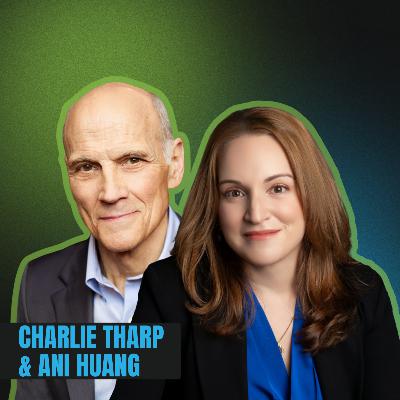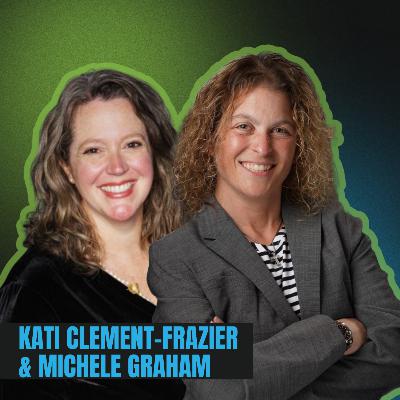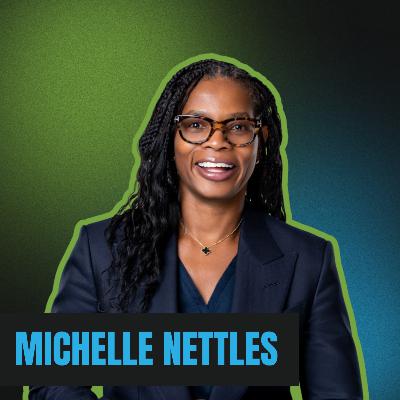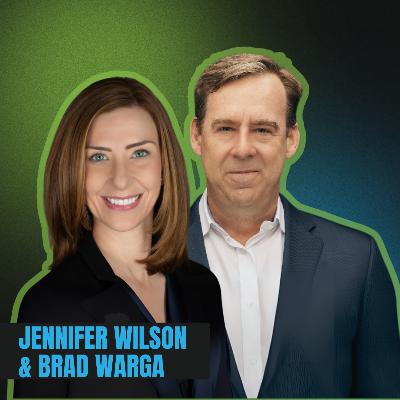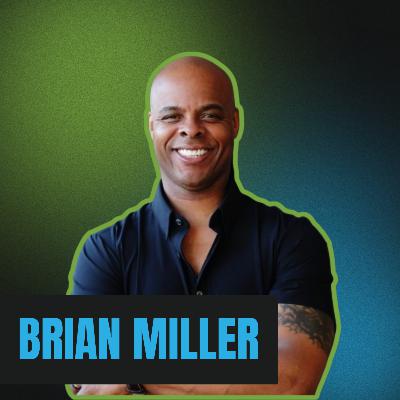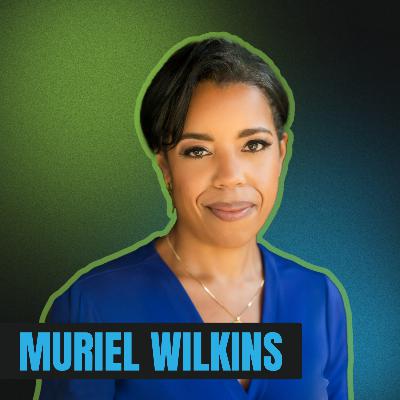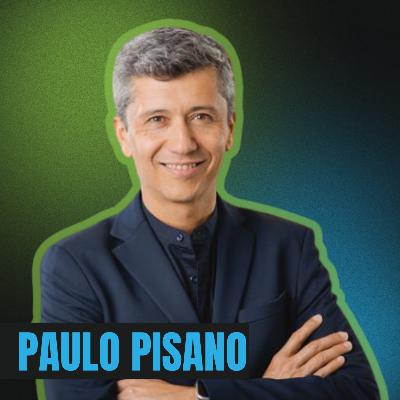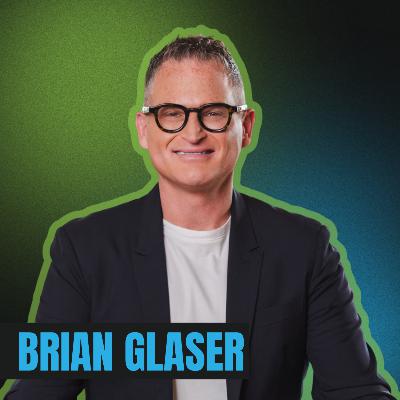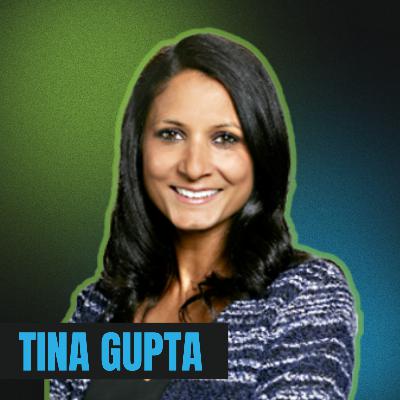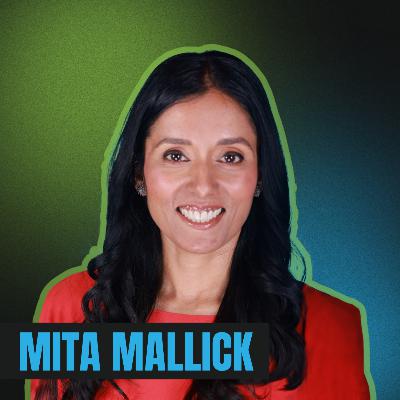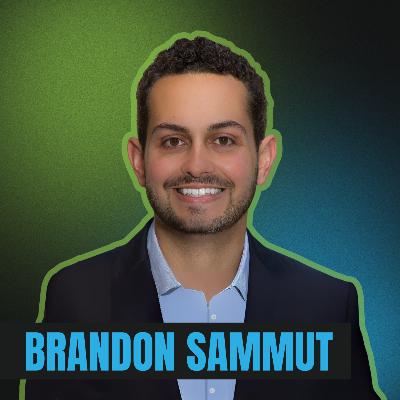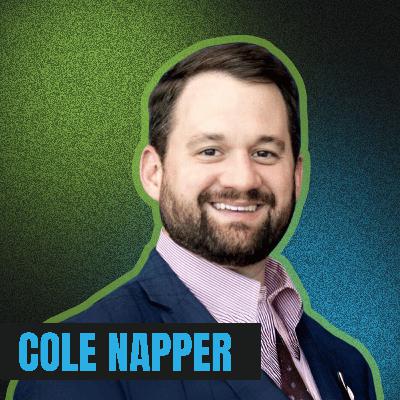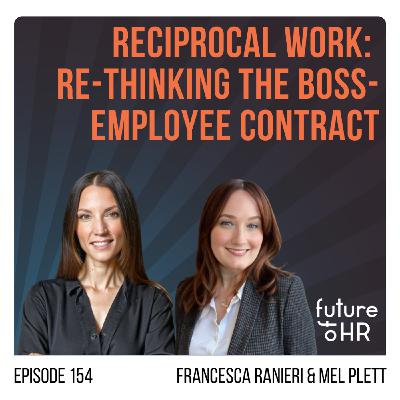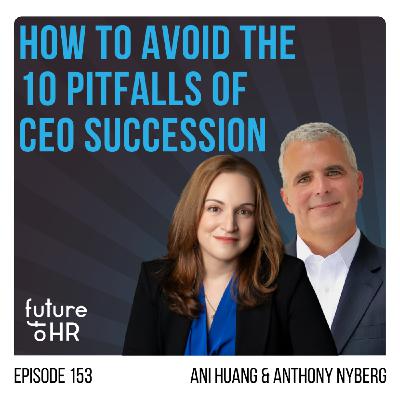Discover Future of HR
Future of HR

Future of HR
Author: JP Elliott
Subscribed: 81Played: 2,365Subscribe
Share
© Nuvos Day Consulting LLC.
Description
The Future of HR is the only podcast whose mission is to inspire the next generation of HR Leaders. In each episode, JP Elliott interviews successful HR executives and thought leaders who share their career journeys, lessons learned, and advice on how to take our field and your career to the next level. If you are a next-gen HR leader looking to fast-track your career, this is the podcast for you.
170 Episodes
Reverse
How does executive compensation shape company culture, performance and deliver shareholder value?Why should CHROs think of executive compensation as a communication tool?My guests in this episode are Ani Huang, President of Policy and Practice at the CHRO Association and Charlie Tharp, Senior Advisor for Research & Practice at the CHRO Association and the Center On Executive CompensationDuring our conversation Ani, Charlie, and I discuss:Why executive compensation is a strategic communication system that signals culture, priorities, and long-term value.How executive compensation aligns to the business strategy and drives long-term value.Why effective executive compensation starts with developing deep financial and business acumen.What builds fairness and transparency in pay systems.How executive compensation can impact the broader pay philosophy.Connecting with Ani and Charlie: Connect with Ani Huang on LinkedInConnect with Charlie Tharp on LinkedInLearn more about CHRO AssociationEpisode Sponsor: Next-Gen HR Accelerator - Learn more about this best-in-class leadership development program for next-gen HR leadersHR Leader’s Blueprint - 18 pages of real-world advice from 100+ HR thought leaders. Simple, actionable, and proven strategies to advance your career.Succession Planning Playbook: In this focused 1-page resource, I cut through the noise to give you the vital elements that define what “great” succession planning looks like.
How can you build learning into how work gets done?Why should organizations think of learning as a system, not as a function?My guest in this episode are Kati Clement-Frazier, Director, School of Leadership at DaVita and Michele Graham, President of Intel and Learn at AmplityDuring our conversation Kati, Michele, and I discuss:Why learning must be treated as an organizational capability, not a set of programs.How psychological safety and reflection accelerate meaningful learning and behavior change.Why “flow of work” learning is about team routines, relationships, and work design—not microlearning.Why the future of learning requires new metrics and new mindsets.Why compliance-driven cultures limit experimentation, agility, and capability building.Connecting with Kati & Michele:Connect with Kati Clement-Frazier on LinkedInConnect with Michele Graham on LinkedInLearn more about The Learning Forum’s CLO LIFT InitiativeEpisode Sponsor:Next-Gen HR Accelerator - Learn more about this best-in-class leadership development program for next-gen HR leadersHR Leader’s Blueprint - 18 pages of real-world advice from 100+ HR thought leaders. Simple, actionable, and proven strategies to advance your career.Succession Planning Playbook: In this focused 1-page resource, I cut through the noise to give you the vital elements that define what “great” succession planning looks like.
How can organizations balance people, profit, and purpose?Why do the most effective HR leaders focus on both intention and impact?My guest in this episode is Michelle Nettles, Global Chief People and Legal Officer at ManpowerGroupDuring our conversation Michelle and I discuss:How HR leaders can balance people, profit, and purpose to drive performance and impact.What it means to be a values-driven leaderWhy organizations should be focusing on capabilities over credentials.Why human skills: curiosity, adaptability, empathy, will define the future of work.Why outdated work models and ideas will be challenged by the next generation of HR leadersConnecting with Michelle: Connect with Michelle Nettles on LinkedInEpisode Sponsor: Next-Gen HR Accelerator - Learn more about this best-in-class leadership development program for next-gen HR leaderHR Leader’s Blueprint - 18 pages of real-world advice from 100+ HR thought leaders. Simple, actionable, and proven strategies to advance your career.Succession Planning Playbook: In this focused 1-page resource, I cut through the noise to give you the vital elements that define what “great” succession planning looks like.
How are CEO expectations for CHROs changing?Why are more CEOs looking for CHROs with non-HR backgrounds?My guests on this episode are Jennifer Wilson and Brad Warga, Partners and Global Co-Heads of the Human Resources Officers Practice at Heidrick & StrugglesDuring our conversation Jennifer, Brad and I discuss:Why CEOs are rethinking what great HR leadership looks like.Why CEOs are prioritizing candidates from strategy, finance, and other non-HR backgrounds.The growing expectation for CHROs to lead enterprise-wide AI strategiesThe widening gap between CHROs and their succession-ready direct reportsPractical and actionable career advice for aspiring CHROsConnecting with Jennifer and Brad: Connect with Jennifer Wilson on LinkedInConnect with Brad Warga on LinkedInRead the Chief People Officer of 2030 report by Heidrick & StrugglesEpisode Sponsor: Next-Gen HR Accelerator - Learn more about this best-in-class leadership development program for next-gen HR leadersHR Leader’s Blueprint - 18 pages of real-world advice from 100+ HR thought leaders. Simple, actionable, and proven strategies to advance your career.Succession Planning Playbook: In this focused 1-page resource, I cut through the noise to give you the vital elements that define what “great” succession planning looks like.
How can belonging unlock performance?Why should we focus on activation, not empowerment to drive innovation?My guest on this episode is with Brian Miller, Chief Talent and D&I Officer at Levi Strauss & CoDuring our conversation Brian and I discuss:How belonging drives performance by creating cultures where people feel valued, heard, and stretched.Why he believes activation is more important than empowermentWhy believability is becoming a critical measure of modern leadership.How AI-driven talent analytics will unlock HR’s next big opportunity.What it means to intentionally build belonging, not just measure it.Connecting with Brian: Connect with Brian Miller on LinkedInEpisode Sponsor: Next-Gen HR Accelerator - Learn more about this best-in-class leadership development program for next-gen HR leadersHR Leader’s Blueprint - 18 pages of real-world advice from 100+ HR thought leaders. Simple, actionable, and proven strategies to advance your career.Succession Planning Playbook: In this focused 1-page resource, I cut through the noise to give you the vital elements that define what “great” succession planning looks like.
How can you identify and reframe your limiting beliefs?Why is awareness not enough to get unblocked?My guest on this episode is with Muriel Wilkins, Founder & CEO of Paravis Partners and author of “Leadership Unblocked.”During our conversation Muriel and I discuss:Why leaders are often their own biggest obstacleHow limiting beliefs quietly undermine our leadership and how to spot themThe hidden blockers successful people carry and how they can stall your progressThe myth of “If I can do it, so can you”—and why true leaders meet people where they areMuriel’s practical three-step roadmap: uncover, unpack, and unblock your limiting beliefsConnecting with Muriel: Connect with Muriel Wilkins on LinkedInLearn more about Muriel’s firm, Paravis PartnersOrder her newest book, Leadership Unblocked: Break Through the Beliefs That Limit Your Potential.
How can culture become an operating system that drives business performance?Why does leadership behavior matter more than systems in driving culture?My guest on this episode is Paulo Pisano, CHRO, Booking Holdings & Chief People Officer, Booking.comDuring our conversation Paulo and I discuss:Why culture is an operating system and how it connects directly to business performance.The three levers that shape culture: behaviors, symbols, and systems—and how to align them with strategy.The importance of experimentation culture for AI adoption and innovation.Why HR leaders must understand business drivers first before designing their programs.How to position HR as "chief simplifiers" who reduce complexity rather than add to it.Connecting with PauloConnect with Paulo on LinkedInEpisode Sponsor: Next-Gen HR Accelerator - Learn more about this best-in-class leadership development program for next-gen HR leadersHR Leader’s Blueprint - 18 pages of real-world advice from 100+ HR thought leaders. Simple, actionable, and proven strategies to advance your career.Succession Planning Playbook: In this focused 1-page resource, I cut through the noise to give you the vital elements that define what “great” succession planning looks like.
How can you develop leaders that have future-ready skills?Why is HR critical to rethinking leadership in the age of AI?My guest on this episode is Brian Glaser, VP & Chief Learning Officer at GoogleDuring our conversation Brian and I discuss:Why leadership today requires curiosity, courage, and the willingness to be wrong.How Google uses next practices to develop leaders who can navigate unprecedented complexity.The role of HR in shaping culture and driving organizational reinvention.How AI can amplify human leadership skills instead of replacing them.Why personalized and in-the-flow learning is essential for high-impact leadership development.Connecting with BrianConnect with Brian on LinkedInEpisode Sponsor: Next-Gen HR Accelerator - Learn more about this best-in-class leadership development program for next-gen HR leadersHR Leader’s Blueprint - 18 pages of real-world advice from 100+ HR thought leaders. Simple, actionable, and proven strategies to advance your career.Succession Planning Playbook: In this focused 1-page resource, I cut through the noise to give you the vital elements that define what “great” succession planning looks like.
How can leaders build an AI-first mindset that drives real culture change?Why is AI adoption more about people than technology?My guest on this episode is Tina Gupta, SVP, Talent Management for New York Life Insurance.During our conversation Tina and I discuss:Why AI adoption is more about people than technologyHow New York Life is scaling AI across 12,000 team membersWhat happens when employees are empowered to innovate with AIWhy managers need to rethink their roles in an AI-driven worldConnecting with TinaConnect with Tina on LinkedInEpisode Sponsor: Next-Gen HR Accelerator - Learn more about this best-in-class leadership development program for next-gen HR leadersHR Leader’s Blueprint - 18 pages of real-world advice from 100+ HR thought leaders. Simple, actionable, and proven strategies to advance your career.Succession Planning Playbook: In this focused 1-page resource, I cut through the noise to give you the vital elements that define what “great” succession planning looks like.
How can you bring your best self to work while being strategically authentic?Why can being your authentic self backfire at work and in life?My guest on this episode is Dr. Tomas Chamorro-Premuzic, International authority on talent and leadership and author of “Don't Be Yourself: Why Authenticity Is Overrated and What to Do Instead.”During our conversation Tomas and I discuss:Why being authentic is overrated The four traps leaders fall into when they decide “just be themselves.”How reputation, not self-perception, determines career successWhy you are always a work in progress and what happens when you stop evolving.Why feedback is the key to self awareness and personal growth. Connecting with TomasConnect with Tomas on LinkedInBuy and read, “Don't Be Yourself: Why Authenticity Is Overrated and What to Do Instead.”Episode Sponsor: Next-Gen HR Accelerator - Learn more about this best-in-class leadership development program for next-gen HR leadersHR Leader’s Blueprint - 18 pages of real-world advice from 100+ HR thought leaders. Simple, actionable, and proven strategies to advance your career.Succession Planning Playbook: In this focused 1-page resource, I cut through the noise to give you the vital elements that define what “great” succession planning looks like.
How can organizations increase connection, collaboration, and performance while offering the flexibility employees desire?Why do leaders hold the key to making hybrid work more effective and impactful?My guests on this episode are Peter Cappelli and Ranya Nehmeh, co-authors of "In Praise of the Office: The Limits to Hybrid and Remote Work"During our conversation Peter, Ranya, and I discuss:Why hybrid work isn’t delivering on its promise for employees or organizations.What’s been lost in remote and hybrid workplaces - mentorship, culture, and career growth.What their research - contrary to popular belief - reveals about hybrid work and its real-world implementation.How leadership accountability is the key to making hybrid work.Clear rules and simple fixes HR can use to strengthen hybrid work.Connecting with Peter and RanyaConnect with Peter on LinkedInConnect with Ranya on LinkedIn Buy and read “In Praise of the Office: The Limits to Hybrid and Remote Work”Episode Sponsor: Next-Gen HR Accelerator - Learn more about this best-in-class leadership development program for next-gen HR leadersHR Leader’s Blueprint - 18 pages of real-world advice from 100+ HR thought leaders. Simple, actionable, and proven strategies to advance your career.Succession Planning Playbook: In this focused 1-page resource, I cut through the noise to give you the vital elements that define what “great” succession planning looks like.
How can you spot a bad boss before it’s too late?What can good leaders learn from bad bosses?My guest on this episode is Mita Mallick, WSJ and USA Today bestselling author of “Reimagine Inclusion and now “The Devil Emails at Midnight: What Good Leaders Can Learn from Bad Bosses”During our conversation Mita and I discuss:What inspired Mita to write “The Devil Emails at Midnight,” and why bad bosses are such a universal concern.The empathy Mita has developed for bad bosses, and why anyone can fall into toxic leadership behaviors.How to spot early warning signs of a bad boss or toxic culture during the interview process—and why many candidates ignore them.Mita’s advice on surviving a bad bossHR’s role in addressing bad bosses and building an inclusive culture. Connecting with MitaConnect with Mita on LinkedIn or learn more about her at Mita’s websiteBuy and read “The Devil Emails at Midnight”Episode Sponsor: Next-Gen HR Accelerator - Learn more about this best-in-class leadership development program for next-gen HR leadersHR Leader’s Blueprint - 18 pages of real-world advice from 100+ HR thought leaders. Simple, actionable, and proven strategies to advance your career.Succession Planning Playbook: In this focused 1-page resource, I cut through the noise to give you the vital elements that define what “great” succession planning looks like.
How can HR leaders embrace disruption to drive innovation?Why should your organization disrupt itself?My guest on this episode is Scott Anthony, Professor at Tuck, Senior Advisor at Innosight and author of “Epic Disruptions - 11 Innovations that Shaped the Modern World”During our conversation Scott and I discuss:The four critical questions every leader must answer about disruption:Why disruption casts three dangerous shadows: shifting power dynamics, status quo bias, and employee identity crisis - and how HR can address each one.Why organizations unintentionally accelerate technologies that threaten their own existence.Why the right strategic choices during disruption often look completely wrong at firstWhat HR leaders can learn from Florence NightingaleConnecting with ScottConnect with Scott on LinkedInBuy and read “Epic Disruptions”Episode Sponsor: Next-Gen HR Accelerator - Learn more about this best-in-class leadership development program for next-gen HR leadersHR Leader’s Blueprint - 18 pages of real-world advice from 100+ HR thought leaders. Simple, actionable, and proven strategies to advance your career.Succession Planning Playbook: In this focused 1-page resource, I cut through the noise to give you the vital elements that define what “great” succession planning looks like..
How can you increase your self-awareness and improve your ability to lead and manage others?Why does emotional intelligence matter more than technical skills for a leader's long-term success?My guest on this episode is Margaret Andrews, author of “Manage Yourself to Lead Others,” Harvard Instructor, and Founder of The MYLO Center.During our conversation Margaret and I discuss:Why understanding and managing yourself is critical to effectively leading others.Why the best leaders help others "grow and glow."The difference between "culture takers" and "culture makers," and what really shapes organizational culture.Why managing up means taking responsibility for the partnership with your manager.How the "next level of you" concept drives personal continuous growth throughout your career.Connecting with MargaretConnect with Margaret on LinkedInLearn more about The MYLO CenterEpisode Sponsor: Next-Gen HR Accelerator - Learn more about this best-in-class leadership development program for next-gen HR leadersHR Leader’s Blueprint - 18 pages of real-world advice from 100+ HR thought leaders. Simple, actionable, and proven strategies to advance your career.Succession Planning Playbook: In this focused 1-page resource, I cut through the noise to give you the vital elements that define what “great” succession planning looks like.
How can HR teams embrace AI to improve both productivity and quality?Why is building AI fluency critical for your career and organization?My guest on this episode is Brandon Sammut, Chief People Officer at ZapierDuring our conversation Brandon and I discuss:The AI fluency framework Zapier uses to evaluate both job candidates and team members.Why every role on Brandon’s People team and across Zapier is being rebuilt with AI at the core, and what this means for raising the talent bar in HR.How AI and automation are enabling Zapier’s People team to focus on more meaningful work which is driving engagement and enhancing careersWhy Zapier’s focus on “Talent Density” led them to raise compensation from the 50th to the 90th percentile.Why Brandon believes AI initiatives should go beyond saving time or money and instead focus on improving the quality of outputs.Connecting with BrandonConnect with Brandon on LinkedInLearn more about Zapier’s AI Fluency framework Episode Sponsor: Next-Gen HR Accelerator - Learn more about this best-in-class leadership development program for next-gen HR leadersHR Leader’s Blueprint - 18 pages of real-world advice from 100+ HR thought leaders. Simple, actionable, and proven strategies to advance your career.Succession Planning Playbook: In this focused 1-page resource, I cut through the noise to give you the vital elements that define what “great” succession planning looks like.
How can People Analytics shift from being a cost center to being a profit center?Why is it critical for HR leaders to transform workforce insights into concrete strategic initiatives?My guest on this episode is Cole Napper, VP Research, Innovation, & Talent Insights at Lightcast and author of People Analytics: Using Data-Driven HR and Gen AI as a Business Asset”During our conversation Cole and I discuss:How generative AI is democratizing data-driven decision making in HR.Why Cole believes more People Analytics leaders could rise to the CHRO role in the next decade.Why people analytics teams need to intentionally link their work to tangible business outcomes.Why generative AI will disrupt traditional HR operating models.Why business acumen isn't just nice to have—it's the fundamental requirement for all HR professionals including people analytics. Connecting with Cole NapperConnect with Cole on LinkedInLearn more about Cole and his new book, “People Analytics: Using Data-Driven HR and Gen AI as a Business Asset”Episode Sponsor: Next-Gen HR Accelerator - Learn more about this best-in-class leadership development program for next-gen HR leadersHR Leader’s Blueprint - 18 pages of real-world advice from 100+ HR thought leaders. Simple, actionable, and proven strategies to advance your career.Succession Planning Playbook: In this focused 1-page resource, I cut through the noise to give you the vital elements that define what “great” succession planning looks like.
How can employees and bosses have honest conversations about what they want and need in their relationship?Why do employees have less than 30 days to build trust in the boss-employee relationship?My guests on this episode are with “Your Work Friends,” Francesca Ranieri, Founder & Head of Strategy, Frank & Mel Plett, Founder Cordelia Consulting. During our conversation Mel, Francesca, and I discuss:How their friendship grew into Your Work Friends—a consulting business and podcast.Why your boss relationship might matter more than your marriage.Why common myths about boss-employee relationships miss what workers and managers really want.What the "30-day cliff" is and why it mattersHow to create an HR strategy that results in changes employees can feel. Connecting with Francesca Ranieri & Mel Plett Connect with Francesca on LinkedInConnect with Mel on LinkedInLearn more about Reciprocal Work or listen to Your Work Friends podcast Episode Sponsor: Next-Gen HR Accelerator - Learn more about this best-in-class leadership development program for next-gen HR leadersHR Leader’s Blueprint - 18 pages of real-world advice from 100+ HR thought leaders. Simple, actionable, and proven strategies to advance your career.Succession Planning Playbook: In this focused 1-page resource, I cut through the noise to give you the vital elements that define what “great” succession planning looks like.
How does trust affect the CEO succession process?Why are CHROs often more critical than CEOs in shaping succession outcomes?My guests on this episode are Ani Huang, Senior Executive Vice President of the HR Policy Association and Anthony Nyberg, Director, Center for Executive Succession at University of South CarolinaDuring our conversation Ani, Anthony, and I discuss:What first-time CHROs must know about CEO succession.Why trust between a CHRO, the board, and the CEO is critical for a successful succession process. How to give boards real exposure to top internal talent.How CHROs can help boards to assess internal vs. external talent objectively.Why CEO role profiles used for succession should be forward-looking and should evolve with strategy changes.Connecting with Ani Huang & Anthony Nyberg: Connect with Ani Huang on LinkedInConnect with Anthony Nyberg on LinkedInDownload the CEO Succession: 10 Pitfalls Boards Must Avoid—and the CHRO Practices That HelpEpisode Sponsor: Next-Gen HR Accelerator - Learn more about this best-in-class leadership development program for next-gen HR leadersHR Leader’s Blueprint - 18 pages of real-world advice from 100+ HR thought leaders. Simple, actionable, and proven strategies to advance your career.Succession Planning Playbook: In this focused 1-page resource, I cut through the noise to give you the vital elements that define what “great” succession planning looks like.
How can a four day week increase productivity while reducing burnout?Why is a four day week working so well for over 300 companies and thousands of employees?My guest on this episode is Juliet Schor, Professor at Boston College and author of “Four Days a Week.”During our conversation Juliet and I discuss:Why, despite decades of labor-saving technology, Americans are working longer hours than ever before.Why rethinking “productivity” is only part of the business case for a four-day week.How work redesign is the key to unlocking both productivity and employee wellbeing.How four-day work weeks dramatically improve retention and make organizations an employer of choice.Real-world examples of four-day work week in tech startups to large manufacturing and even restaurants.Connecting with Juliet: Connect with Juliet Schor on LinkedInEpisode Sponsor: Next-Gen HR Accelerator - Learn more about this best-in-class leadership development program for next-gen HR leadersHR Leader’s Blueprint - 18 pages of real-world advice from 100+ HR thought leaders. Simple, actionable, and proven strategies to advance your career.Succession Planning Playbook: In this focused 1-page resource, I cut through the noise to give you the vital elements that define what “great” succession planning looks like.
How do you unlock the power of employee experience?Why is a people-first mindset so critical in modernizing HR?My guest on this episode is Assil Omar, VP, People Experience, AbbVie.During our conversation Assil and I discuss:Why we should embrace new opportunities as a way to reinvent ourselves and our careers.How AbbVie maintains a unique culture of purpose, performance, and careWhy HR practitioners must become students of both human motivation and organizational transformation to drive real impact.Why it’s important to start with the employee experience first when designing systems.Her advice to HR leaders who want to start a people experience teamConnecting with Assil: Connect with Assil Omar on LinkedInEpisode Sponsor: Next-Gen HR Accelerator - Learn more about this best-in-class leadership development program for next-gen HR leadersHR Leader’s Blueprint - 18 pages of real-world advice from 100+ HR thought leaders. Simple, actionable, and proven strategies to advance your career.Succession Planning Playbook: In this focused 1-page resource, I cut through the noise to give you the vital elements that define what “great” succession planning looks like.


